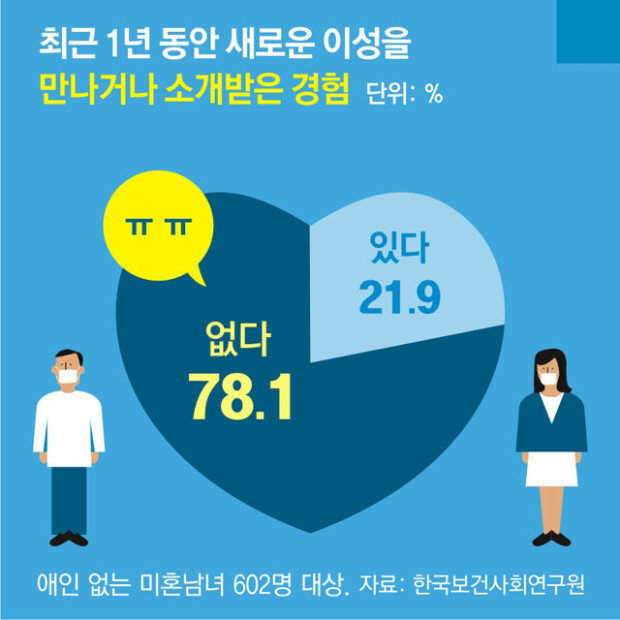78% singles fail to find a new date since the corona outbreak
78% singles fail to find a new date since the corona outbreak
Posted May. 14, 2021 07:24,
Updated May. 14, 2021 07:24

A 30-year-old female office worker has been leading a “solo” life since she broke up with her boyfriend in December 2019. She intends to move on, but opportunities are scarce. “In the past, I’d find a date naturally from social gatherings, but now there are not many opportunities to meet people in person owing to the pandemic, so it is hard to find anyone.” “Between home and work and remote working, I don’t go out nor see my friends often,” said another officer worker in her 30s. “It is difficult to make a new relationship.”
An interesting research finding come up that the COVID-19 pandemic has been affecting the dating life of men and women in South Korea at a forum titled “Population shift and policy implications of COVID-19 era,” which was jointly held by the Korea Institute for Health and Social Affairs and the Population Association of Korea. Choi Seul-gi, a professor at the KDI Graduate School of International Policy, and Gye Bong-oh, a sociology professor at Kookmin University, surveyed 2,000 male and female adults between 25 and 49 in South Korea from Feb. 5 to Feb. 15 to analyze how COVID-19 affected their dating, marriage, and childbirth prospects.
Among 602 unmarried individuals without a date, 78.1% said they didn’t see anyone nor go out on a blind date since the outbreak of COVID-19. Asked how often they found new dates or went on a blind date compared to the pre-pandemic times, 48.7% reported a fall in frequency. Among them, 50.8% said “not changed,” and only 0.5% reported an increase.
When asked if the pandemic affected their perspective on marriage, the answer differed depending on their gender. The portions of men who “hate marriage more” and “want marriage more” were similar at 10.9% and 10.3%, respectively. By contrast, much more women detested marriage (20.7%), tripling the share of respondents who wanted to get married more (5.9%). “The reason behind such a finding could be found in the fact that women struggled in the job market relatively more than men since the outbreak of COVID-19,” conjectured Professor Choi.
Experts expressed concerns that the dwindling social interactions and severe unemployment issues as well as the sluggish economy are having an impact on the entire cycle of dating, marriage, and childbirth. “Given that the pandemic is here to stay, it could become part of the fabric of dating patterns and marital practices in South Korea,” said Goo Jeong-woo, a sociology professor at Sungkyunkwan University. “This might further accelerate the crisis of population precipice.”
ksy@donga.com







